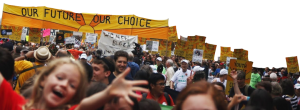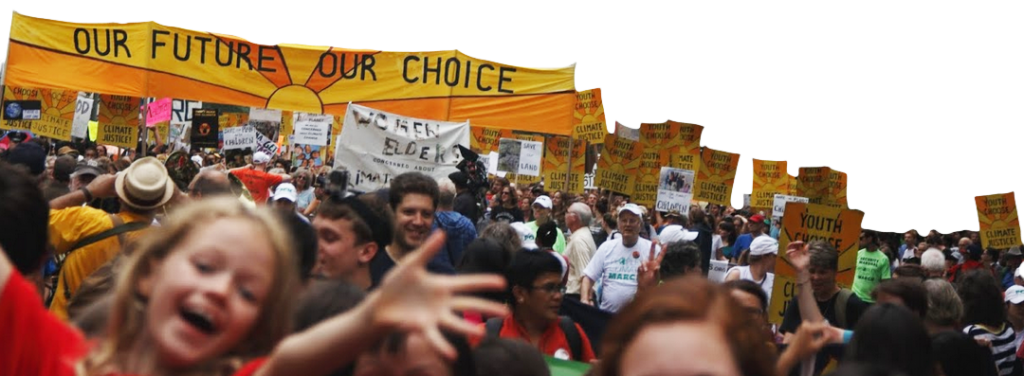The Earth is, and has been, dying. This death is being guided mostly by human hands. But it is a gradual and subtle process.
We don’t suffer the loss of our home being taken from us because we are unaware that it’s happening. One is distracted by of all the little details that consist of being a person in our modern society. There is getting a degree, there is getting a job with that degree, there are bills, mortgage, etc.
Between worrying about this struggle for existence, we are provided technological “luxuries” such as iPhones and computers and junk which help grant us a sort of solace. In our time spent being in love with our things a lot is missed, such as the cost to make these things. There is an inherent ignorance towards sourcing, in which the production of a thing is seen as a result without a process.
Uranium is a means to the end which is radioactive energy—”clean” energy (some bullshit). Uranium can be found in the northern portions of New Mexico and Arizona and a little bit into Utah which is the Navajo nation. There was this absurd idea proposed by the U.S. government that there were no people living in this region. But this is a blatant lie, for the land is Navajo, and yet it is still considered an ideal site for uranium mining. So the mining companies bring the jobs and backs the Navajo people into a corner, which promises a bright future at the cost of unmentioned radiation and disparity.
Leona Morgan, a native of the Diné of the Navajo nation, spoke on the matter at the Wang Center here at Stony Brook University. She shared an anecdote of her home of Dinétah.
She spoke of the disaster that occurred in Churchrock, New Mexico. Here occurred the biggest nuclear accident in U.S. history. The local water sources had become completely contaminated. People would come to Morgan in order to ask her why the water hurt them when they went in it.
There are current plans by Uranium Resources Inc. to have in situ recovery of uranium in Churchrock. During this process, the minerals are dissolved and pumped to the surface for extraction—a process similar to hydraulic fracturing.
Morgan’s organization, The Eastern Navaja Diné Against Uranium Mining, which consists primarily of Diné youths, work against these projects that put their native lands at risk of unchecked nuclear development. Despite the nuclear development being targeted onto less-populated lands, the radiation can still spread.
Similarly, on the events of the 2011 Fukushima nuclear reactor meltdown, former nuclear executive of Nuclear Energy Services Arnie Gunderson who blew the whistle on this company after discovering radioactive material in an accounting safe, notes the spread of the fallout during an interview on Democracy Now!:
“You’ve got radiation being detected 60 miles to the north in a Navy helicopter, a hundred miles to the east on a Navy aircraft carrier,” He indicates how the radiation from the Fukushima plant is bleeding into the ocean daily.
Where uranium powers energy, energy powers production and production is growth and that is what we’re all about. Nuclear power provides “over 11 percent of the world’s electricity as continuous, reliable base-load power, without carbon dioxide emissions,” according to the World Nuclear Association.
This “clean” energy production is considered attractive, despite the fact that radioactive waste takes hundreds of thousands of years to decay. Not to mention the risk of radioactive leakage. The Fukushima disaster having been the result of an earthquake damaging the reactors. The World Nuclear Association estimates about 20 percent of nuclear reactors are built near fault lines.
Gunderson indicates how these nuclear reactors, all built by General Electric, have been deemed by the Nuclear Regulatory Commission to be flawed designs which should have never been implemented since 1972.
This is the basis of “growth:” to recklessly develop in order to efficiently produce and provide commodities for our modern consumer lifestyle. The growth is stimulated by consumption of materials and use of labor. These things combined, create the abstract of capital, which is apparently important for success of human society.
This foundation is efficient for what its objective is. But completely ineffective in a broader perspective. Providing for consumption presents a sacrifice. This is the law of equivalent exchange. In order to create something, something of equivalent exchange must be sacrificed.
When there is a demand for new smartphone models, materials must be harvested and then manufactured in order to be created. Labor must be involved as well, which often lead to harmful exposures—be it radiation or carbon emissions.
In the shadow created by the ivory towers of the commanders of commerce, life is too dark and quiet to notice this disparity endured by the Navajo nation people; by the Japanese who were forced from their homes as a byproduct of innovation, and all other “invisible” groups. All we can see are the ivory towers themselves—the creation of humankind’s supremacists. They can be so awe inspiring that we’ve become distracted from the horrific basis which created these products.
Seeing only the ivory tower, life appears okay. But life isn’t okay. At the cost of having romantic hours with technological cop-out, and the struggle of school, work, etc. which keeps us “growing,” the place where all life grows, the Earth, is dying.
This is a quiet topic, though. “Leaders” of the world don’t address it because it would be contradictory to the priority of economic capital. The common people don’t address it because we live in such a grandeur comfort that to take away the freedom to do whatever we think we want would be inconvenient. With so much comfort and so little pain, there is no sense of anything being broken.
Either our luxurious comfort protects us from knowing any pain to ourselves, our planet, or our human kin; or they protect us from being too bummed out about how powerless we think we are.
Growth is a powerful tool for feeding pride—a hunger which can satisfy one’s basis of existence. The feeling of being successful as something novel in itself reduces its process to a means to the end.
In reaction to the nuclear meltdown at Fukushima, the Japanese government enacted a cleanup effort which had a primary service to economy instead of ecology. Japanese interpreter, Rachel Clark, explained these events at the Wang Center. She described how there was an initiative to scrape about a foot-or-so of top-soil off the immediately contaminated areas around Fukushima in order to remove the radiation. The waste was then stored in bags which have roughly a three-year life spas. This stimulated jobs in Japan and led to thousands of garbage bags filled with radioactive dirt sitting outside people’s homes.
These various tactics, which establish a mesh of economic success overlay the fact that the planet is being decimated. There is a limitless creation happening because it is being perpetrated by exploitation. Labor and nature are what suffer here directly. Many of the nice things we have today we shouldn’t have, but this exploitation make them available by force.
And so here we’ve come to a pass. To act or to not act. To continue our rental on life or to have it be our own—to fight for it. For the fate of the planet is one that shouldn’t be held by few.
In the history of these sort of things, rallies have led to actual change in administrative policy. When people walk the street marching with a resolve for justice in them, they spark a feel that all humans have—kinship. A march is an engagement of a shared agitation as well as a direction for change in what a group of people commonly consider to serve to the betterment of society that which they are an integral part.
This fight is happening right now. Over 400,000 people gathered on September 21 in the streets of New York City to demonstrate the injustices they, and everyone in the world face before the UN Climate Summit, two days following.
Director of the Stony Brook Sustainability Studies program, Dr. Heidi Hutner, together with about seventy Stony Brook students and faculty expressed the importance of this march,
“It’s the beginning of a bigger advocacy, and we hope through that, there will be changes. Hopefully it will not take too long because we don’t have any time to waste.
“We don’t have time. We have to do it now.”
Hutner points out that the massive turnout alone shows that there is thought in the right place, which means “people will vote, people will notice in the press, and people will be educated.”
Education which shows there is a problem and clears the invisible matter which brings the disparity all these groups face to the forefront.
The Diné must fight to keep Uranium mining off their land, the Japanese are provided jobs that profit off the fact that their country has experienced one of the worst nuclear meltdowns in recent history.
It is education which eliminates the fragmentation of climate change. It binds the disparity of these groups into one whole system. With education bound in kinship, we won’t wait until the effects of climate change happen in our own backyard.
Instead of sacrificing the quality of our air, drinking water, food, etc. in order to have an iPhone; we could sacrifice the iPhone, or the automobile, in order to have these clean, pertinent-to-survival necessities.
The clean-necessity based lifestyle is in competition with the commodity-tempting, highly aggressive industries whose hunger is bottomless, whose promises are only fit for their vision; a chance to live in their world. A world where growth is measured in consumption.
Industries can easily dominate because their initial competition is a seemingly stagnant entity; an entire ecosystem. Though, tt reacts stronger than it ever had, in the form of super-storm Sandy or typhoon Haiyan. But these are still isolated events which draw relief efforts that repair destruction in order to return to business-as-usual instead of remodeling our habits.
The idea of change is now the fight for change. There is no quiet transition to what is in our best interest as a global society. We as the humans of this dying world must end our own suffering now. It is in solidarity of our fellow human that this change could be had.

